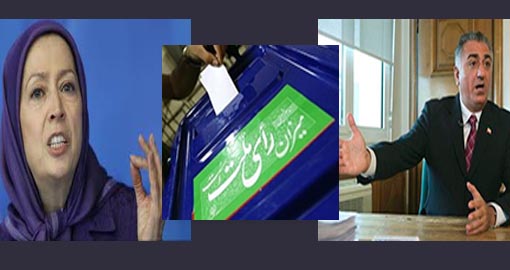Only, a few weeks left to the presidential elections in Iran, the Mujahedin Khalq Organization (the MKO/MEK/the Cult of Rajavi) has launched its predictable propaganda campaign against the Islamic Republic. As usual, the group labels the Iranian elections as “sham”.
Reviewing the substance of elections in governing systems around the world it is worth to compare them with elections held in both ruling systems of the Islamic Republic and the Cult of Rajavi.
Elections are the central institution of democratic systems. The principal mechanism for linking public opinion into the system’s authority is the holding of elections.
All modern democracies hold elections, but not all elections are democratic. Right-wing dictatorships, Marxist regimes, and single-party governments also stage elections to give their rule the impression of legitimacy. In such elections, there may be only one candidate or a list of candidates, with no alternative choices. These are not democratic elections.
In contrast, democratic elections are not merely symbolic but they are competitive, periodic, inclusive, definitive elections in which the main decision-makers in a government are selected by citizens.
A look at the history of the MKO and the Iranian government demonstrates the dimensions of democracy that are observed in each establishment. While the MKO cult leaders accuse the Iranian authorities of being fundamentalist, dictator and undemocratic there have never recorded a fair election in the whole history of the group. The above-mentioned type of undemocratic elections are exactly the only ones that were held in the MKO. No matter the person is supposed to be selected for what rank, there is always one candidate and members are supposed to vote for this only one without any opposition. In the voting process, there is no polling station, no ballot box. No one’s vote is secret. Members of the Cult of Rajavi have to raise their hands in a public ceremony to indicate their agreement with the selected person. There is no alternative choice and there is no option to dissent the selected person.
Compare this undemocratic system to the one in Iran. Despite all deficiencies, the elections in Iran are competitive, periodic and inclusive in which candidates from the two main political wings including conservatives and reformists take part. They run their presidential campaigns, participate in debates and try to challenge their rivals, much similar to what takes place in famously known democracies in Europe and America.
Leaders of the Cult of Rajavi run their propaganda machine against the Iranian presidential elections as they are backed by certain warmonger figures of the US government who find them as the enemy of their enemy. Saeed Kamali Dehghan of the Guardian finds the exiles such as Reza Pahlavi and the MKO that seek regime change in Iran, as people “who are irrelevant to modern Iran, yet appeal to gullible Americans”.
KamaliDehghan accurately asserts that the MKO and the Monarchists do not represent the aspirations of the Iranian People. “Nevertheless, the Iranian people by and large still believe in gradual change, however slow the pace of reform might be,” he writes. “Huge turnouts for elections represent a rejection of the sort of things that Pahlavi and Rajavi have to offer.”
He confirms that the MKO is never a reliable source for the enemies of the Iranian nation. “In their constant mission to demonise Iran, the US, Israel and Saudi Arabia have heavily relied on groups such as MEK,’’ he suggests. “The fact of the matter is that they remain out of touch with the realities on the ground.”
By Mazda Parsi
*Kamali Dehghan, Saeed, Iran’s people care about elections. The so-called democratic fringe doesn’t, The Guardian, April 28, 2017



